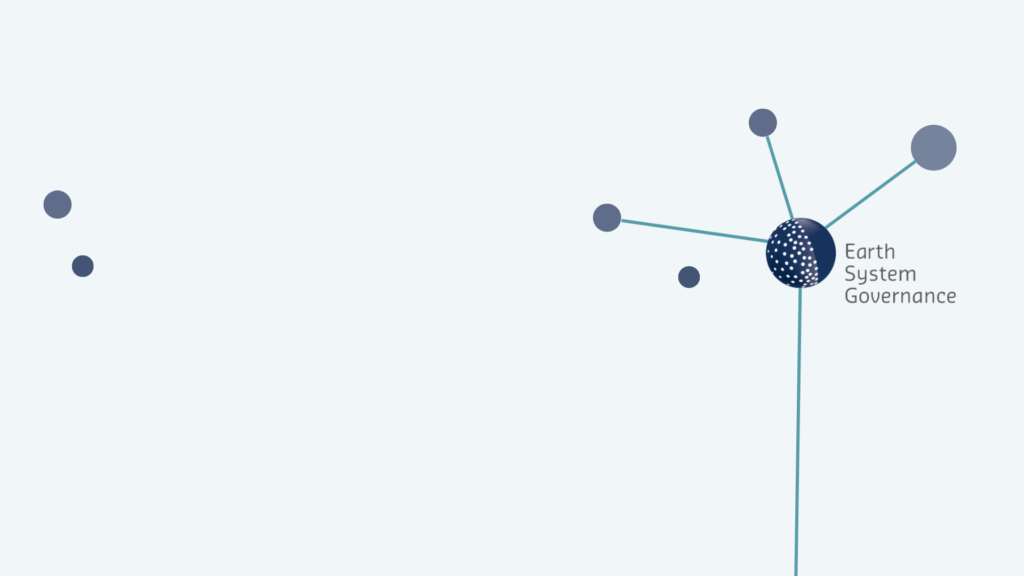Governing Global Sustainability in a Complex World
Key Research Insights & New Research Directions
Utrecht University, The Netherlands, 5-8 November 2018
We are delighted to invite you to the 2018 Utrecht Conference on Earth System Governance, to be held 5-8 November 2018 in Utrecht, The Netherlands.
Please see the Conference Website for more and frequently updated information.
Key Dates:
- Deadline for paper abstracts: 19 March 2018 21 March 2018
- Notification of acceptance: 2 April 2018
- Full papers due: 1 November 2018
The 2018 Utrecht Conference stands in a long tradition of global conferences on earth system governance, from Amsterdam (2007 and 2009) to Colorado (2011), Lund (2012), Tokyo (2013), Norwich (2014), Canberra (2015), Nairobi (2016), and Lund (2017). In this long-standing event series, the Utrecht Conference will have a special status: in 2018, the Earth System Governance Project’s current Science and Implementation Plan will be replaced by a new 10-year science plan; and new, enthusiastic leadership will take over the helm of our project.
This conference will hence focus on harvesting the many findings of our community over the last decade, combined with a bold outlook to the future and the next scientific challenges for earth system governance research.
Keynotes
Confirmed keynote speakers are Steven Bernstein, University of Toronto; Michele M. Betsill, Colorado State University; Harriet Bulkeley, Durham University; Jennifer Clapp, University of Waterloo; Peter Driessen, Utrecht University; John Dryzek, University of Canberra; Lorraine Elliott, Australian National University; Piet Hoekstra, Utrecht University; Norichika Kanie, Keio University; Louis Lebel, Chiang Mai University; Diana Liverman, University of Arizona; James Meadowcroft, Carleton University; Dirk Messner, German Development Institute; David Mungai, University of Nairobi; Lennart Olsson, Lund University; Susan Park, University of Sydney; Ortwin Renn, Institute for Advanced Sustainability Studies; Michelle Scobie, University of the West Indies; and Oran R. Young, University of California at Santa Barbara. Frank Biermann will present the key insights of the last 10 years of the Earth System Governance Project, and the Project’s new Science and Implementation Plan will be introduced by Sarah Burch, Waterloo University; Aarti Gupta, Wageningen University; Cristina Inoue, University of Brasília; Agni Kalfagianni, Utrecht University; and Åsa Persson, Stockholm Environment Institute.
Conference Streams
The 2018 Utrecht Conference will be organized around the core analytical problems that have structured the last decade of earth system governance research, while providing an outlook on emerging themes and new directions. Abstracts can be submitted to one of the following six conference streams:
1. Architectures of Earth System Governance. We invite papers that reflect on the complexity of governance systems in the context of increasing cross-sectoral and cross-scale interdependencies, and growing institutional interplay between environmental and non-environmental domains (e.g. global trade, security, technology). Core questions include: How can we evaluate the performance of complex governance architectures? What is the relationship between complexity and concepts such as fragmentation and polycentricism? How and why can complex earth system governance architectures be governed more effectively?
2. Agency in Earth System Governance. We invite papers that build on the knowledge created over the past ten years and that further advance understanding of the actors and agents that drive earth system governance and the ways in which authority is granted to them and how it is exercised. We welcome papers on the influence, roles and responsibilities of both state actors and non-state actors, such as NGOs, cities, corporations, public-private partnerships, or science networks. Core questions are: How is authority shifting in earth system governance and with what kind of implications? How do different agents exercise agency in earth system governance, and how can we evaluate their relevance? Which are the emerging actors and how will they influence earth system governance in the years to come?
3. Accountability, Legitimacy and Democracy in the Anthropocene. We invite papers on the accountability, legitimacy and overall democratic quality of earth system governance. What are the sources of accountability, legitimacy, and democracy in earth system governance? What are the effects of different forms and degrees of accountability and legitimacy, as well as types of democracy and authoritarianism for the performance of governance systems? What institutional designs can produce the accountability, legitimacy and democratic quality of earth system governance in a way that guarantees balances of interests and perspectives in a world of increasing diversity?
4. Allocation, Access and Equity in Earth System Governance. Earth system governance is, as is any political activity, fundamentally about the distribution of material and immaterial resources and values. It is, in essence, a conflict about the access to goods and about their allocation – it is about justice, fairness, and equity. How can we reach interdisciplinary conceptualizations and definitions of allocation and access and of planetary justice? What (overarching) principles underlie allocation, access and equity? How can broader justice demands be reconciled with governance effectiveness?
5. Adaptiveness, Resilience, and the Transformation of Earth System Governance. We invite papers on the adaptiveness, resilience, and transformation of earth system governance, a theme that includes related concepts such as adaptation, adaptive management, vulnerability and reflexivity. What are the politics of adaptiveness and transformations? Which governance processes foster it? What attributes of governance systems enhance capacities to adapt or transform? How, when and why does adaptiveness influence earth system governance transformation?
6. Theoretical and Methodological Foundations of Earth System Governance. Finally, we invite papers that analyse the theoretical foundations and implications of new ways of thinking about governance and earth system transformations, including concepts such as the Anthropocene, earth system stewardship, planetary boundaries, and the extent to which they are related and to which they differ. Moreover, we invite papers that seek to identify and further develop the appropriate methods to study earth system governance, including papers that study options for integrating social science-based work with study programmes grounded in the natural sciences, computer-based modelling, imagination and anticipation experiments, and scenario work. Finally, we welcome papers that critically discuss the role of science and scientists in the Anthropocene, and that discuss how scientific communities can become agents of resistance, change, and transformations.
Types of Proposals
Individual papers
We invite submissions of abstracts of up to 400 words that address either the main conference theme; one or more of the six conference streams; or any other topic that is relevant to the Earth System Governance Project.
All abstracts will be anonymized and evaluated in double-blind peer-review by generally five members of our conference review panel.
Full panels
In addition, we invite Panel proposals that address the main conference theme; one or more of the six conference streams; or any other topic relevant to the Earth System Governance Project.
Panel proposals must include a description of the panel (300 words or less), 4-5 abstracts (each up to 400 words), as well as the name of a chair and a discussant. Please note that all paper abstracts will be evaluated individually in the general double-blind peer-review of the conference, with the possible outcome that only some papers submitted for a panel might eventually be accepted. Only panels with three or more accepted papers will be included in the programme. If fewer than three papers for the panel are accepted, these accepted papers will be integrated into other panels.
Innovative sessions
We also welcome proposals for non-traditional sessions, such as roundtables (which may include policy-makers, academics, or representatives of social movements and non-governmental organizations), policy games, book launches, and book seminars (that may discuss recently published academic works in the field). All non-traditional sessions can be proposed directly to the conference organizers by e-mail: UC2018@earthsystemgovernance.org. Proposals should include a description of the session (1 page) and a list of participants. Proposals will be reviewed by the conference organizers and members of the review panel.
Please note that while there is no limit on the number of submissions, individuals will only be permitted to present, at a maximum, 2 papers.
The Special Taskforce and Meeting Day on 8 November
On Thursday, 8 November, extensive meeting space – including joint lunches and a special session on Science-Policy Interactions – will be provided for back-to-back events of our Project’s Taskforces and Affiliated Projects, as well as early-career workshops, author writing retreats, planning sessions, workshops on teachings and methods, and similar events. Suggestions for such meetings can be submitted to UC2018@earthsystemgovernance.org by 1 April 2018 (in exceptional cases, also later). We will ensure wide dissemination of the events through our network, and assist with formal registration. All interested conference participants can select the event they plan to participate in through the conference registration form.
Winter School on Earth System Governance, 31 October – 4 November 2018
Prior to the conference we will organize a five-day Winter School on Earth System Governance. The Winter School will focus on key concepts and new ideas in earth system governance research. The Winter School is meant both for early-career researchers already familiar with the Earth System Governance Project and those new to this broad research field. More information on content and registration will be made available separately on our conference website – www.earthsystemgovernance.org/utrecht2018.
Additional information
The organizers are undertaking all efforts to secure travel support for participants who are based at institutions in developing countries and for early-career researchers. To the extent that travel funds are available, they will be disbursed on merit basis according to the relative ranking of the abstract. Acceptance of a paper for presentation does not guarantee travel support.
Details on abstract submission and answers to frequently asked questions are available at our conference website www.earthsystemgovernance.org/utrecht2018.
More information on the Earth System Governance Project can be found at www.earthsystemgovernance.org
We look forward to welcoming you to Utrecht in November 2018!
Co-Chairs
Frank Biermann, co-chair, 2018 Utrecht Conference on Earth System Governance
Agni Kalfagianni, co-chair, 2018 Utrecht Conference on Earth System Governance
Hosts
Utrecht University, Faculty of Geosciences, Copernicus Institute of Sustainable Development
Earth System Governance Project
Co-Hosts and Sponsors
Colorado State University, Environmental Governance Working Group, United States of America
German Development Institute, Germany
Institute for Advanced Sustainability Studies, Germany
Keio University, Japan
Utrecht University, Strategic Programme “Institutions for Open Societies”, The Netherlands
Utrecht University, Strategic Programme “Pathways to Sustainability”, The Netherlands
University of Waterloo, Faculty of Environment, Canada
Partner Alliances
Academic Council of the United Nations System
Future Earth
International Social Science Council (ISSC)
Stakeholder Forum for a Sustainable Future
Conference Manager
Sandra van der Hel, Utrecht University
Earth System Governance International Project Office
Ruben Zondervan, Executive Director
Charlotta Kjöllerström, Network Coordinator and Administrative Assistant
Contact
E-Mail: UC2018@earthsystemgovernance.org
Twitter: #ESG2018


